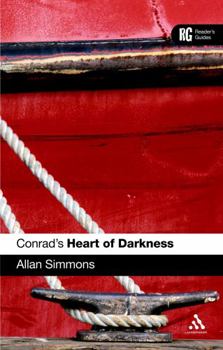Conrad's Heart of Darkness
Select Format
Select Condition 
Book Overview
Reader's Guides provide a comprehensive starting point for any advanced student, giving an overview of the context, criticism and influence of key works. Each guide also offers students fresh critical insights and provides a practical introduction to close reading and to analysing literary language and form. They provide up-to-date, authoritative but accessible guides to the most commonly studied classic texts.
Format:Paperback
Language:English
ISBN:0826489346
ISBN13:9780826489340
Release Date:April 2007
Publisher:Continuum
Length:144 Pages
Weight:0.45 lbs.
Dimensions:0.4" x 5.5" x 8.5"
Customer Reviews
2 ratings
A powerful exploration of the themes and ideas of this classic text, and a 'must' for comprehensive
Published by Thriftbooks.com User , 15 years ago
An overview of the novel HEART OF DARKNESS joins others in Continuum's 'Character Studies' series and offers discussions of the narrative structure and narrators key to the text's reading. High school to college-level students of Conrad will find this a powerful exploration of the themes and ideas of this classic text, and a 'must' for comprehensive study.
"Mistah Kurtz--he dead." An influential work on five 20th century seminal works
Published by Thriftbooks.com User , 17 years ago
I read this book for a graduate Humanities course. Joseph Conrad's Heart of Darkness, written in 1899 is a seminal work about the ills of colonialism, as well as a postmodern look at the subject of mankind. Conrad's book had a crucial influence on five important works of the twentieth century: J. G. Frazier's book The Golden Bough. Jessie L. Weston's book From Ritual to Romance, T. S. Elliott's poem the Waste Land, Joseph Campbell's Hero with a Thousand Faces, and Francis Ford Coppolla's movie Apocalypse Now, screenplay by John Milius, was based on Conrad's book. Another interesting fact is that this work was read by Orson Welle's Mercury Theater Players on the radio and was to be his first movie. After doing some work on it he abandoned the project to do Citizen Kane! I would have loved to of seen what Welles could have done with this story. Conrad's story is so riveting in part, because he himself served as a riverboat captain. High school teachers and college professors who have discussed this book in thousands of classrooms over the years tend to do so in terms of Freud, Jung, and Nietzsche; of classical myth, Victorian innocence, and original sin; of postmodernism, postcolonialism, and poststructuralism. Just a taste of the plot reels you in! Marlow, the narrator of Heart of Darkness and Conrad's alter ego, is hired by an ivory-trading company to sail a steamboat up an unnamed river whose shape on the map resembles "an immense snake uncoiled, with its head in the sea, its body at rest curving afar over a vast country and its tail lost in the depths of the land" (8). His destination is a post where the company's brilliant, ambitious star agent, Mr. Kurtz, is stationed. Kurtz has collected legendary quantities of ivory, but, Marlow learns along the way, is also rumored to have sunk into unspecified savagery. Marlow's steamer survives an attack by blacks and picks up a load of ivory and the ill Kurtz; Kurtz, talking of his grandiose plans, dies on board as they travel, downstream. Sketched with only a few bold strokes, Kurtz's image has nonetheless remained in the memories of millions of readers: the lone white agent far up the great river, with his dreams of grandeur,his great store of precious ivory, and his fiefdom carved out of the African jungle. Perhaps more than anything, we remember Marlow, on the steamboat, looking through binoculars at what he thinks are ornamental knobs atop the fence posts in front of Kurtz's house and then finding that each is "black, dried, sunken, with closed eyelids-a head that seemed to sleep at the top of that pole, and with the shrunken dry lips showing a narrow white line of the teeth" (57). I especially became interested in Joseph Conrad's Heart of Darkness from the movie Apocalypse Now. There is a scene in the movie that shows Colonel Kurtz's nightstand in his cave. T. S. Elliott's poem the Waste Land is one of three books on the nightstand. The other two are Jessie L. Weston's book From





